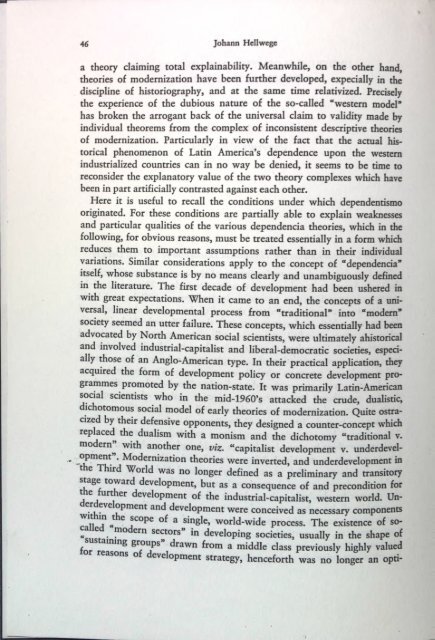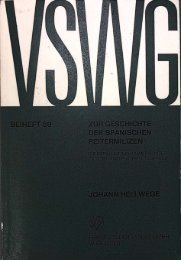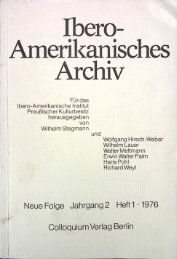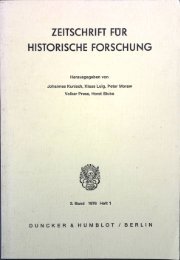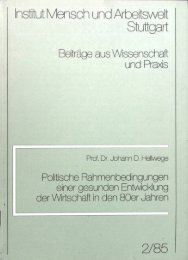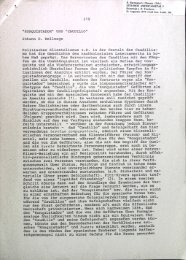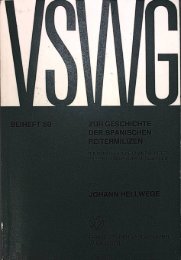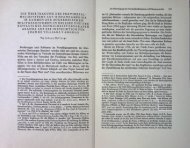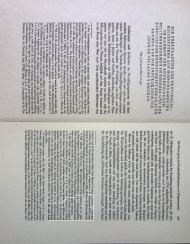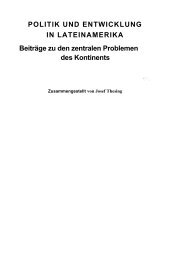9_Law and State_Volume 17
You also want an ePaper? Increase the reach of your titles
YUMPU automatically turns print PDFs into web optimized ePapers that Google loves.
46 Johann Hellwege<br />
a theory claiming total explainability. Meanwhile, on the other h<strong>and</strong>,<br />
theories of modernization have been further developed, expecially in the<br />
discipline of historiography, <strong>and</strong> at the same time relativized. Precisely<br />
the experience of the dubious nature of the so-called “western model”<br />
has broken the arrogant back of the universal claim to validity made by<br />
individual theorems from the complex of inconsistent descriptive theories<br />
of modernization. Particularly in view of the fact that the actual historical<br />
phenomenon of Latin America’s dependence upon the western<br />
industrialized countries can in no way be denied, it seems to be time to<br />
reconsider the explanatory value of the two theory complexes which have<br />
been in part artificially contrasted against each other.<br />
Here it is useful to recall the conditions under which dependentismo<br />
originated. For these conditions are partially able to explain weaknesses<br />
<strong>and</strong> particular qualities of the various dependencia theories, which in the<br />
following, for obvious reasons, must be treated essentially in a form which<br />
reduces them to important assumptions rather than in their individual<br />
variations. Similar considerations apply to the concept of “dependencia”<br />
itself, whose substance is by no means clearly <strong>and</strong> unambiguously defined<br />
in the literature. The first decade of development had been ushered in<br />
with great expectations. When it came to an end, the concepts of a universal,<br />
linear developmental process from “traditional” into “modem”<br />
society seemed an utter failure. These concepts, which essentially had been<br />
advocated by North American social scientists, were ultimately ahistorical<br />
<strong>and</strong> involved industrial-capitalist <strong>and</strong> liberal-democratic societies, especially<br />
those of an Anglo-American type. In their practical application, they<br />
acquired the form of development policy or concrete development programmes<br />
promoted by the nation-state. It was primarily Latin-American<br />
social scientists who in the mid-1960’s attacked the crude, dualistic,<br />
ichotomous social model of early theories of modernization. Quite ostracized<br />
by their defensive opponents, they designed a counter-concept which<br />
rep aced the dualism with a monism <strong>and</strong> the dichotomy “traditional v.<br />
modern” with another one, viz. “capitalist development v. underdevelopment<br />
. Modernization theories were inverted, <strong>and</strong> underdevelopment in<br />
t e ird World was no longer defined as a preliminary <strong>and</strong> transitory<br />
stage toward development, but as a consequence of <strong>and</strong> precondition for<br />
j e , urt er development of the industrial-capitalist, western world. Une.r,<br />
f Ve °Pment ar>d development were conceived as necessary components<br />
11 !T « C j COPe a s*ngle, world-wide process. The existence of so-<br />
“tucf • •tl° em sectors” *n developing societies, usually in the shape of<br />
f nm^ Sr°^Ps drawn from a middle class previously highly valued<br />
ns o evelopment strategy, henceforth was no longer an opti


